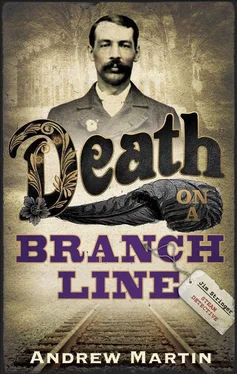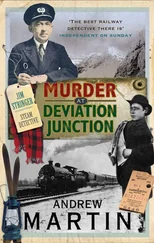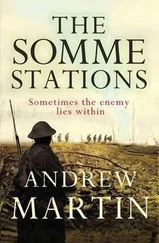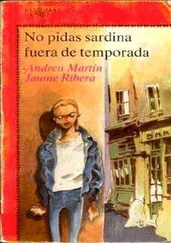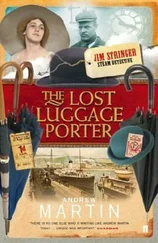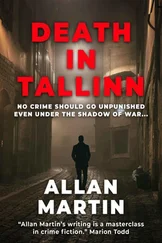Andrew Martin - Death on a Branch line
Здесь есть возможность читать онлайн «Andrew Martin - Death on a Branch line» весь текст электронной книги совершенно бесплатно (целиком полную версию без сокращений). В некоторых случаях можно слушать аудио, скачать через торрент в формате fb2 и присутствует краткое содержание. Жанр: Классический детектив, на английском языке. Описание произведения, (предисловие) а так же отзывы посетителей доступны на портале библиотеки ЛибКат.
- Название:Death on a Branch line
- Автор:
- Жанр:
- Год:неизвестен
- ISBN:нет данных
- Рейтинг книги:5 / 5. Голосов: 1
-
Избранное:Добавить в избранное
- Отзывы:
-
Ваша оценка:
- 100
- 1
- 2
- 3
- 4
- 5
Death on a Branch line: краткое содержание, описание и аннотация
Предлагаем к чтению аннотацию, описание, краткое содержание или предисловие (зависит от того, что написал сам автор книги «Death on a Branch line»). Если вы не нашли необходимую информацию о книге — напишите в комментариях, мы постараемся отыскать её.
Death on a Branch line — читать онлайн бесплатно полную книгу (весь текст) целиком
Ниже представлен текст книги, разбитый по страницам. Система сохранения места последней прочитанной страницы, позволяет с удобством читать онлайн бесплатно книгу «Death on a Branch line», без необходимости каждый раз заново искать на чём Вы остановились. Поставьте закладку, и сможете в любой момент перейти на страницу, на которой закончили чтение.
Интервал:
Закладка:
I rounded a bend and came upon the silent poles, and their confederates, the silent tracks. I slowed somewhat as I went past the downed stretch of cable. It struck me that railway policemen ought to be issued with portable telegraph instruments. With these, and a length of cable looped over the right wire, it was possible to send your own messages.
Running now along the railway sleepers, I looked up. The poles carried six wires: telegraph and telephone either way — that accounted for four. The other two would be the wires linking the signal boxes of the branch, for the sending of the signalmen’s bell codes. To send a message, you’d have to know which was which; you’d need the portable doings, and you’d need to go beyond the point of the cut. Then you’d be within reach of the normal world, and sanity.
I kicked up my boot-heels and I flew on. The station, waiting on the far side of a tree-made arch, seemed to swing and shake as I pounded down the track.
I found it quite deserted, like a ship becalmed. But Will Hamer and his horse and donkey stood dreaming in the station yard, with the rulley hitched up behind.
I ran at the fellow, gulping at air and unable at first to speak.
Instead, Hamer spoke.
‘It’s you again,’ he said, smiling.
‘There’s a man badly injured in the woods,’ I said. ‘I’ve just come from him. He’s near the bridge over the ditch.’
‘I know that spot,’ said Hamer, who was now not quite smiling but still looking amiable, ‘On the edge of Clover Wood.’
So there were separately named woods within the woods.
‘He may have fallen out of a tree,’ I said.
‘Aye,’ Will Hamer said, ‘I expect so.’
‘Will you fetch a doctor?’
‘Aye,’ Hamer said again, making no move, ‘I will do.’
‘Where is a doctor?’
‘Well now, East Adenwold,’ Hamer said. ‘Doctor Lawson — deliver to him regular like. Very good man for an emergency if you can catch him in.’
‘You’d better look sharp,’ I said. ‘I reckon the fellow’s dying. Might you un-harness the donkey? I mean, wouldn’t the horse be quicker on its own?’
Hamer looked at his horse for a while. Presently, he said, ‘Wouldn’t move at all on his own, wouldn’t that bloke. Pair of ’em might go a bit faster, though, and don’t think I en’t tried a few tricks. I’ve had ’em this way and that: him to the left, him to the left. You name it, I’ve tried it.’
I stood silent. Was there any other way of getting help to Gifford apart from employing this blockhead?
‘… Mangel wurzels I’ve tried,’ he was saying. ‘Short rein, long rein…’
He turned and fixed on me a sort of questioning smile.
‘You look down-hearted, mister,’ he said.
‘There’s blood coming out of the bloke’s mouth,’ I said, ‘and that’s always a bad look-out.’
‘Might be his… tooth fallen out?’
‘Will you go off just now?’ I said. ‘I’ll go back to guard the bloke, and I’ll see you at the place.’
I indicated the rulley.
‘You’ll get that along the edge of the field — there’s a track of sorts.’
‘Oh, no bother,’ he said, and he fell to smiling at me.
I felt in want of a whistle to blow and a green flag to wave.
‘Come on, men!’ Hamer shouted at last, and the horse and donkey first awoke, and then moved.
I took off my jacket, and watched them cross the station yard, but as before they rolled to a stop after twenty yards.
‘While I think on…’ Hamer called out, and I thought: Christ, he wants to be paid. But that wasn’t it. He was passing a paper to me.
‘Your wire was delivered,’ he said, ‘earlier on, like.’
It was an acknowledgement of sending, written on a chit stamped: ‘The Booking Office, West Adenwold Station.’
‘Obliged to you,’ I said, ‘but I knew it had gone off, because the fellow I sent for arrived.’
‘What fellow?’ said Hamer, and instead of answering, I gave his horse’s arse a good slap, which set the three on their way again. I watched them out of sight, then raced back through the station and around the woods.
I came to the bridge just as two rabbits went flying across it. I looked about. Birdsong twisted through the drowsy air. I walked a little way along the margin of the wood. I looked about once again. The sun beat down on the brambles and the cow parsley.
Neither Gifford, nor his bag, nor the little red locomotive, were anywhere to be seen.
I stood still for a space, thinking of everything and nothing. Finally I sat down by the bridge, exhausted.
This place Adenwold, I thought… It’ll be the bloody finish of me. I made no further attempt to scout about. There was no sound but the steady, heavy drone of insects. I looked at my silver watch: five to two. I felt honour-bound to wait for the doctor. It was important that somebody kept up sensible behaviour. When the chimes of two o’clock floated over from the village, I moved under the big oak for shade, and took the papers of Hugh Lambert from my pocket.
‘Mr Richardson, the station master at Adenwold during our childhood,’ I read… and that pulled me up short, for starters. It was hard to imagine the station without Hardy: he seemed such a fixture of Adenwold, his own strangeness matching that of the village. I read on:
… Mr Richardson would bring Ponder on in his railway interests, and father would undoubtedly have written to the Company demanding his removal had the man been anything less than a model official. His top hat was lustrous, and the staff were most punctilious under his eye, as even father admitted. Richardson personally sent telegrams by the dozen for father, using the station machine, and always with a smile and always without charging. But he would talk trains with the boy! And how could father state that the railways were neither sporting nor aristocratic? That they had paid grandfather too little for right of way over his land, a fact serving to remind father that the estate was small, the family not as well-off as commonly imagined, and he only a Baronet? Father expressed himself delighted at Richardson’s retirement, but the new man wore a bowler instead of a topper and did not keep the place so well. How many times did father cancel Ponder’s subscription to the Railway Magazine? And how often did he wearily reinstate it during a fit of guilt? It wasn’t so much my brother’s reading and collection of the Railway Magazines that antagonised father, as the sending-off for the special binders with the railway crests. (I should say that Ponder, an incredibly untidy person for all his orderly mind, liked the idea of binders more than the act of binding.) The writing-in of letters by Ponder was still more to be deprecated, and the publication of articles under his own name doubly so. I remember Ponder showing the first of his letters to appear in cold print. It appeared under the heading: ‘A correspondent asks for information concerning the vacuum brake now installed’. He pointed to the word ‘correspondent’ and then to himself, and he grinned. He then promptly won a carriage clock for one of his railway essays. I asked him whether it had been an essay on carriages but nothing so modest: ‘How to Improve the Summer Services’ was his theme. Not some of them, but all. And Ponder ought to know, for he’d spent almost the whole summer lying on the croquet lawn and reading timetables, relayed to him in batches free of charge, I believe, by Mr Richardson. Ponder would seek out the innovations: a new restaurant car between St Pancras and Leeds; a train from York to Hull booked one minute later than the previous month. It was the drag of interrelatedness that fascinated him, the way that one train couldn’t be moved until another had been. He was quite lost to it all; and he was lost to father, too. Ponder did not retreat so much as fade from the battleground, with the result that father and I concentrated our fire on each other, and in this connection too the railway figured, for it was the railway that took me to London, and my other life.
Читать дальшеИнтервал:
Закладка:
Похожие книги на «Death on a Branch line»
Представляем Вашему вниманию похожие книги на «Death on a Branch line» списком для выбора. Мы отобрали схожую по названию и смыслу литературу в надежде предоставить читателям больше вариантов отыскать новые, интересные, ещё непрочитанные произведения.
Обсуждение, отзывы о книге «Death on a Branch line» и просто собственные мнения читателей. Оставьте ваши комментарии, напишите, что Вы думаете о произведении, его смысле или главных героях. Укажите что конкретно понравилось, а что нет, и почему Вы так считаете.
